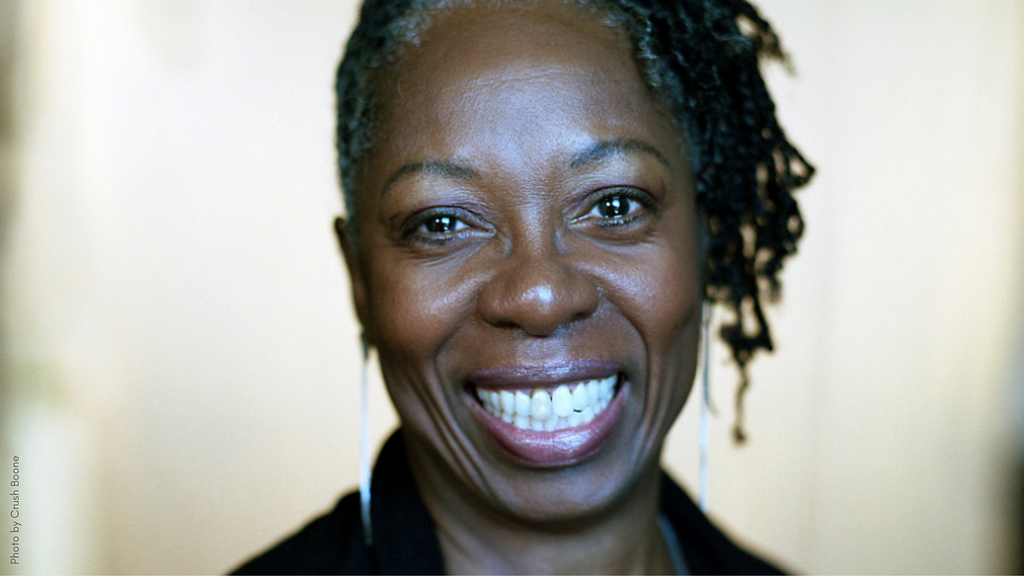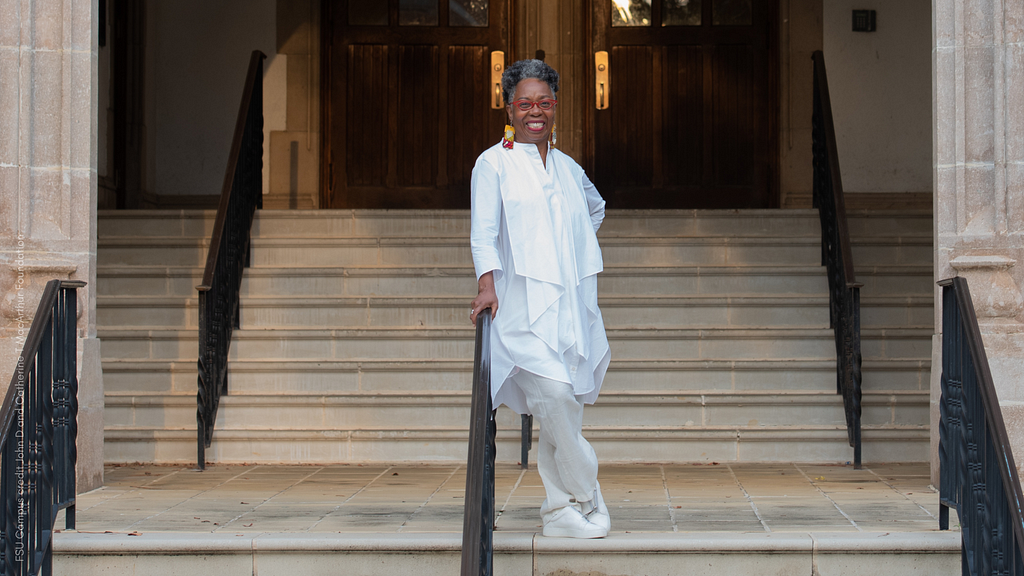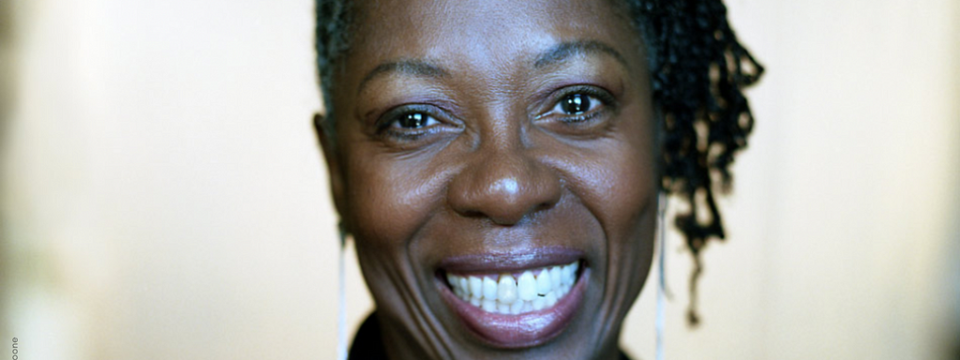Jawole Willa Jo Zollar of Urban Bush Women: 5 Things I Wish Someone Told Me When I First Became An Artist

Always figure out how to have fun. It’s really important; work and life have to be fun! It doesn’t mean that everything is fun, but you have to find the joy and the fun in the work.
As a part of our series about “5 Things I Wish Someone Told Me When I First Became An Artist” I had the pleasure of interviewing Jawole Willa Jo Zollar.
Jawole Willa Jo Zollar is the founder of Urban Bush Women (UBW), a dance company dedicated to exploring the use of cultural expression as a catalyst for social change that is currently celebrating its 40th Anniversary. Zollar is receiving a 2024 Samuel H. Scripps/American Dance Festival lifetime achievement award for leading the way in transforming and diversifying the field of dance through her masterful and innovative storytelling that focuses on the importance of cultural identity, equity, and community engagement as well as her careful lifting up and nurturing of women choreogrpahers of color which has had a profound impact on the art form. In addition to creating over 34 works for Urban Bush Women, Zollar has created works for Alvin Ailey American Dance Theater, Philadanco, and many universities across the United States. Zollar has also received multiple awards, including the “Bessie” Lifetime Achievement in Dance Award for her work in the field and the Martha Hill Dance Fund Lifetime Achievement Award.
Thank you so much for doing this with us! Can you tell us the story of how you grew up?
That’s a long story! I grew up in Kansas City, Missouri, in the 1950s. Living in an all Black community and going to all Black schools during a time of de facto segregation really shaped my whole aesthetic framework. I was immersed in the culture of African Americans and the African diaspora. My mother was a dancer and jazz singer and my father sold real estate and ran a bar called Al & Bud’s. During this era, black businesses were booming and there was great hope of upward mobility after World War II. I grew up performing in shows in Black neighborhoods.
In addition to 5 brothers and sisters, along with my mother, father, and grandfather, there were always other people who lived with us that were taken in by the generosity of my parents. During segregation, it wasn’t uncommon for people to support and care for each other — that’s how we functioned at that time, you took people in and you took care of them. People lived with us who had fallen on hard times or were otherwise just needed care.
Can you share a story with us about what brought you to this specific career path?
My sister and I were dancing as young children at our local dance studio owned by Joseph Stevenson. I loved dancing and I loved performing but I didn’t think that it could be a career path until I got to college and saw that in fact, you could major in dance. Once I realized that, I knew I wanted to focus on the thing that I loved. I earned my B.A. in dance from the University of Missouri at Kansas City and my M.F.A. in dance from Florida State University. Shortly after I moved to New York, I founded Urban Bush women. I wanted to make work and look at the folklore, religious traditions, and the culture of African Americans and the African diaspora. This became deep immersion into experimental approaches that enabled artists to strengthen their involvement in cultural organizing and civic engagement, which evolved into key programs and free community offerings.
Can you tell us the most interesting story that happened to you since you began your career?
The first time I went out of the country, I traveled by myself for Parallels and Black, a program sponsored through a dance theater workshop for 5 Black choreographers from different kinds of aesthetics. I arrived a week early because I wanted to experience Paris since I’d never been there before. After heading out to a club one night, what I didn’t realize is that unlike New York, the subway stopped at midnight. I just assumed it ran for twenty four hours a day. I learned the subway opened back up at 5 or 6 am and also how smokey the clubs could be. I finally left that morning, smelling like smoke, with a lesson learned: don’t assume New York experiences are similar to other places.
What are some of the most interesting or exciting projects you are working on now?
I’m the director of Scat!… The Complex Lives of Al & Dot, Dot & Al Zollar ,a new dance-driven musical theater work that’s slated to premiere this year at Bard SummerScape and tours from August 2024 to February 2025. Scat! is an auto-biomythography of my family’s story and a multidisciplinary love story of two people making their way during the Great Migration.
Through song, dance, and storytelling that follows the powerful journey of the Zollar family at the intersection of dreams and the harsh realities of American life in the 40s & 50s. Scat! will be performed live with an original jazz score by composer jazz trombonist Craig Harris, with seven musicians and eight dancers. Scat! puts scat singing, a form of vocal improvisation center stage.
This work is intended to be an immersive work, flexible in how it’s presented. I love that I get to work in and explore this form that I love that I grew up with, jazz music! Additional performances will take place at the American Dance Festival, and The Perelman Performing Arts Center in New York.
Who are some of the most interesting people you have interacted with? What was that like? Do you have any stories?
It’s a real treat to work alongside Craig S. Harris; he’s the award-winning composer of Scat! but so much more. He’s a trombonist, bandleader, and gifted sonic shaman. His discography of his own recorded work in addition to contributing to the musical projects of various iconic musicians is a mile long. He is a progressive thought leader who uses art as a cultural vehicle to promote change and comment on social injustice and humanity.
Where do you draw inspiration from? Can you share a story about that?
I tell people my job as a creative artist is to be inspired. I draw inspiration from everything and I make it a part of my work. Whether I’m on a walk, or going to a museum or a movie, my job is to be inspired and notice.
As someone who’s lived a lot and seen a lot, I draw inspiration from the legacy of kindness my parents provided. I draw inspiration from people’s true individual and collective potential to use movement as a catalyst for social change, growth, healing, and community building. I draw inspiration from culture.
How have you used your success to bring goodness to the world?
I didn’t initially think of it as success, but I realized I could have a platform through the Choreographic Center that could be used to lift up the voices of Black women choreographers through fellowship, mentorship, and visibility. Collective cultural growth across generations is so much bigger than typical wins that society acknowledges. That was one of the values that was really important to me. So many gave to me and provided for me. The communities I performed in growing up and the mentors, advocates, organizers, and audiences I’ve met along the way grounded my art in powerful art-making processes. Through the unfolding of my life work, friends and sponsors have supported key Urban Bush Women programs including the Choreographic Center, BOLD (Builders, Organizers, and Leaders through Dance) program, and the Summer Leadership Institute. As one example, the generosity of McKenzie Scott who campaigned for donations including Urban Bush Women as an organization doing the work.
I’m proud of creating an organization that is currently celebrating 40 years using movement as a catalyst for social change thanks, in part, to the recognition and support from the MacArthur Genius Award, Dorothy and Lillian Gish prize, and the Ford Foundation “American Cultural Treasure” grant award to name a few. Thanks to the generosity of donors, our key learning and development programs have reached countless leaders.
This year, I’m honored to accept the 2024 Samuel H. Scripps/American Dance Festival Award for a lifetime of doing what I love. I want to make sure I carry on this tradition.

What are your “5 things I wish someone told me when I first started” and why?
1 . I’m actually glad no one told me that the performing arts is not just about the art; it’s about the business of art. Approaching the business with the same degree of care and focus that I approach the art is essential. Finding that out just became a part of the learning process. If anyone had told me, it might have discouraged me.
2 . It’s important to protect your public persona and your private persona. Those are two different things.
3 . There’s a perception from people that are new to the arts that touring is glamorous. Based on what we see on stage as the final production, it’s easy to glamorize but for working performers, it’s anything but glamorous. We still have to do things like lug our suitcases from flight to flight for example, and switch from get-it-done mode to being in a space where we can make art.
4 . You have to love the arts if you do it for a living; if you do it for money, you’ll never be satisfied. It’s not something I wish people had told me, I think I knew it, but it’s important young artists know they run the risk of being disappointed and unfulfilled.
5 . Always figure out how to have fun. It’s really important; work and life have to be fun! It doesn’t mean that everything is fun, but you have to find the joy and the fun in the work.
You are a person of great influence. If you could inspire a movement that would bring the most amount of good to the most amount of people, what would that be? You never know what your idea can trigger. 🙂
I would influence a change in the healthcare system. It’s a travesty that we are such a wealthy country that our healthcare system is exploitative and extractive. It isn’t taking care of people, especially under-resourced people without a lot of income or access to education, equal opportunity, and supportive services. I grew up seeing people care for those who needed help, that’s just the way it was in the communities I lived and performed in. It is a horrendous experience for people who don’t know how to navigate it and it’s one of the big causes of bankruptcy. There should not be medical debt, a devastating and avoidable outcome for families, especially for those who are still owed reparations for hundreds of years of contributions to this society.
I had a friend who lived in France that had the same battery of medical tests as I did. His cost was around $50.00 and my cost was $25,000.00. The insurance I had covered a lot of it, but I had to pay a lot out of pocket.
We have been blessed that some of the biggest names in Business, VC funding, Sports, and Entertainment read this column. Is there a person in the world, or in the US whom you would love to have a private breakfast or lunch with, and why? He or she just might see this.
Ava Duvernay. I think she’s a sharp, amazing artist, documentarian, and filmmaker. It’s the way she sees the world. It’s my dream that she would do a documentary on my life work and Urban Bush Women because she sees 360 degrees on the topics and situations that are happening. She gets complex phenomena. I also like that she doesn’t try to be reductive.
What is the best way our readers can follow you on social media?
Follow @UBDance on Instagram and Facebook!
This was very inspiring. Thank you so much for joining us!
Jawole Willa Jo Zollar of Urban Bush Women: 5 Things I Wish Someone Told Me When I First Became An… was originally published in Authority Magazine on Medium, where people are continuing the conversation by highlighting and responding to this story.
